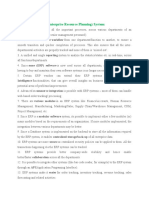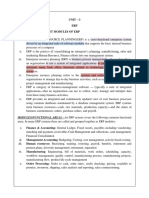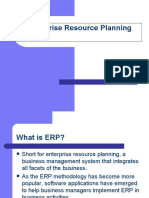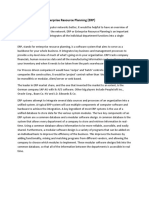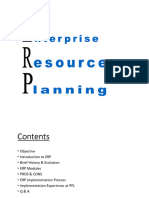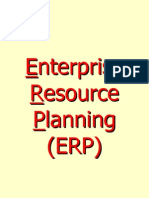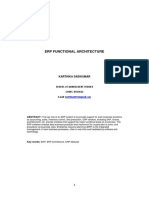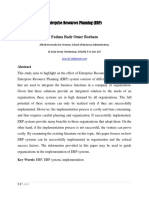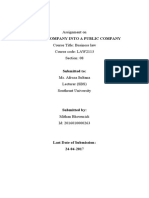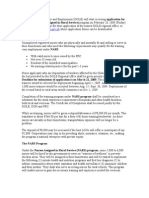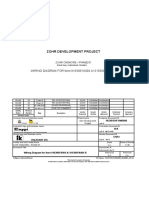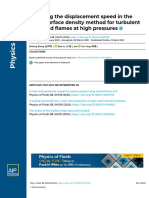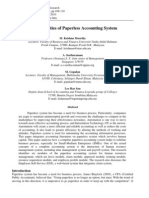Assignment on
Enterprise resource planning (ERP)
Course Title: Human Resources Management
Course code: MGT3125
Section: 01
Submitted to:
Mohammad Abdullah Al Mamun
Assistant Professor
Southeast University
Submitted by:
Mithan Bhowmick
Id: 2016010000263
Date of Submission:
18-07-2017
�What is Enterprise resource planning (ERP)?
Enterprise resource planning (ERP) is business process management software that allows an
organization to use a system of integrated applications to manage the business and automate
many back office functions related to technology, services and human resources. ERP
software integrates all facets of an operation — including product planning, development,
manufacturing, sales and marketing — in a single database, application and user interface.
Advantages of Enterprise resource planning:
1. Complete visibility into all the important processes, across various departments of an
organization (especially for senior management personnel).
2. Automatic and coherent workflow from one department/function to another, to ensure a
smooth transition and quicker completion of processes. This also ensures that all the inter-
departmental activities are properly tracked and none of them is ‘missed out’.
3. A unified and single reporting system to analyze the statistics/status etc. in real-time,
across all functions/departments.
4. Since same (ERP) software is now used across all departments, individual departments
having to buy and maintain their own software systems are no longer necessary.
5. Certain ERP vendors can extend their ERP systems to provide Business Intelligence
functionalities that can give overall insights on business processes and identify potential areas
of problems/improvements.
6. Advanced e-commerce integration is possible with ERP systems – most of them can
handle web-based order tracking/ processing.
7. There are various modules in an ERP system like Finance/Accounts, Human Resource
Management, Manufacturing, Marketing/Sales, Supply Chain/Warehouse Management,
CRM, Project Management, etc.
8. Since ERP is a modular software system, its possible to implement either a few modules
(or) many modules based on the requirements of an organization. If more modules
implemented, the integration between various departments may be better.
9. Since a Database system is implemented on the backend to store all the information
required by the ERP system, it enables centralized storage/back-up of all enterprise data.
10. ERP systems are more secure as centralized security policies can be applied to them. All
the transactions happening via the ERP systems can be tracked.
�Disadvantages of ERP (Enterprise Resource Planning) Systems:
1. The cost of ERP Software, planning, customization, configuration, testing,
implementation, etc. is too high.
2. ERP deployments are highly time-consuming – projects may take 1-3 years (or more) to
get completed and fully functional.
3. Too little customization may not integrate the ERP system with the business process & too
much customization may slow down the project and make it difficult to upgrade.
4. The cost savings/payback may not be realized immediately after the ERP implementation
& it is quite difficult to measure the same.
5. The participation of users is very important for successful implementation of ERP projects
– hence, exhaustive user training and simple user interface might be critical. But ERP
systems are generally difficult to learn (and use).
6. There may be additional indirect costs due to ERP implementation – like new IT
infrastructure, upgrading the WAN link, etc.
7. Migration of existing data to the new ERP systems is difficult (or impossible) to achieve.
Integrating ERP systems with other stand-alone software systems is equally difficult (if
possible). These activities may consume a lot of time, money & resources, if attempted.
8. ERP implementations are difficult to achieve in decentralized organizations with disparate
business processes and systems.
9. Once an ERP system is implemented it becomes a single vendor lock-in for further
upgrades, customizations etc. Companies are at the discretion of a single vendor and may not
be able to negotiate effectively for their services.
10. Evaluation prior to implementation of ERP system is critical. If this step is not done
properly and experienced technical/business resources are not available while evaluating,
ERP implementations can (and have) become a failure.
